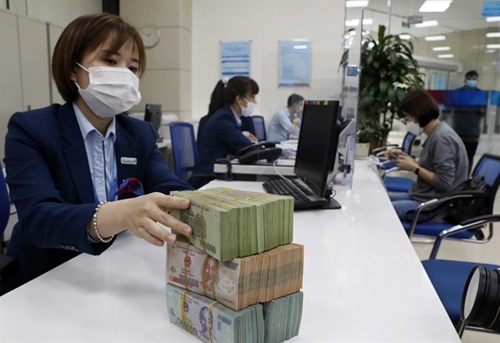Statistics from MBS Securities Company show that the total corporate bond issuance volume since the start of the year has reached over 57.1 trillion VND (2.2 billion USD), a 62% increase year-on-year. The weighted average interest rate on corporate bonds in the first five months is estimated at around 9.3%, higher than the 8.3% average in 2023.
    |
 |
|
Banks use bond issuance as a source of capital to support their long-term lending and meet regulatory requirements. (Photo for illustration) |
Real estate remains the industry group with the highest issuance value at around 25.3 trillion VND, up 4% over the last year and accounting for 44% of the total. The weighted average interest rate is 12.3% per annum with an average term of 2.4 years.
Property developers from the top issuers include Vinhomes with 10 trillion VND, Vingroup (10 trillion VND) and Hai Dang Real Estate Development Investment Co., Ltd. (2.5 trillion VND).
The banking sector is second with a total issuance value of 19.9 trillion VND, up from 400 billion VND in the same period last year, accounting for 35%. The weighted average interest rate on bank bonds is 5.3% per annum with an average term of 4.8 years.
The banks with the largest bond issuance values include HDBank (5 trillion VND), Techcombank (4.5 trillion VND) and Maritime Bank (3.8 trillion VND).
According to the latest forecast by VIS Rating, banks are expected to need 283 trillion VND (11.1 billion USD) in additional Tier-2 bonds over the next one to three years.
Over the past five years, Vietnamese banks have become increasingly dependent on market-based capital sources to meet long-term capital needs and ensure capital safety requirements, as deposit growth has slowed.
Banks have increased the issuance of long-term bonds to supplement capital and capital safety in order to comply with operational safety ratio regulations. They have issued a total of 196 trillion VND in bonds in 2023, higher than the 104 trillion VND in 2019. And Tier-2 capital bonds account for 35% of the total bond issuance volume.
These lenders use bond issuance as a source of capital to support their long-term lending and meet regulatory requirements.
Meanwhile, state-owned banks and some smaller private banks rely more on Tier-2 capital bonds in their capital structure.
VIS Rating expects the banking industry will release over 283 trillion VND worth of Tier-2 bonds over the next three years. About 55% of the new Tier-2 bonds will be issued by state-owned banks as the Tier-2 capital of these banks will be significantly deducted.
According to regulations, outstanding Tier-2 bonds counted towards regulatory capital will be deducted by around 20% each year in the final five years before maturity.
Banks will need to issue new Tier-2 capital bonds to replace the bonds being deducted and increase their capital adequacy ratio. Some small private banks with weak profitability will issue Tier-2 capital bonds to support a 3-4% capital adequacy ratio.
Additionally, some medium and large private banks will use Tier-2 capital bonds to support their high credit growth targets.
The investment demand for Tier-2 capital bonds from individual investors remains high, VIS Rating added. Individual investors hold the majority of publicly offered Tier-2 capital bonds, mainly due to the higher yields compared to deposits and regular bonds.
Bank bonds are primarily privately placed to help issuing institutions raise capital quickly with minimal documentation requirements.
They will increase their public offerings of Tier-2 capital bonds to better tap into the strong demand from retail investors, as issuing institutions will no longer be able to privately place bonds with retail investors who are not professional investors.
However, investors should be aware of the risks associated with this investment product, such as lack of payment guarantees, insurance and the possibility of early redemption, VIS Rating experts warned.
Source: VNA